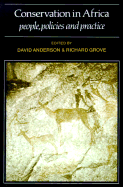Book contents
- Frontmatter
- Contents
- Preface
- List of contributors
- Introduction: The scramble for Eden: past, present and future in African conservation
- Part One Conservation ideologies in Africa
- Introduction
- 1 Early themes in African conservation: the Cape in the nineteenth century
- 2 Chivalry, social Darwinism and ritualised killing: the hunting ethos in Central Africa up to 1914
- 3 Colonialism, capitalism and ecological crisis in Malawi: a reassessment
- 4 Conservation with a human face: conflict and reconciliation in African land use planning
- Part Two Wildlife, Parks and Pastoralist
- Part Three Conservation priorities and rural communities
- Part Four Consequences for conservation and development
- Index
1 - Early themes in African conservation: the Cape in the nineteenth century
Published online by Cambridge University Press: 04 April 2011
- Frontmatter
- Contents
- Preface
- List of contributors
- Introduction: The scramble for Eden: past, present and future in African conservation
- Part One Conservation ideologies in Africa
- Introduction
- 1 Early themes in African conservation: the Cape in the nineteenth century
- 2 Chivalry, social Darwinism and ritualised killing: the hunting ethos in Central Africa up to 1914
- 3 Colonialism, capitalism and ecological crisis in Malawi: a reassessment
- 4 Conservation with a human face: conflict and reconciliation in African land use planning
- Part Two Wildlife, Parks and Pastoralist
- Part Three Conservation priorities and rural communities
- Part Four Consequences for conservation and development
- Index
Summary
By the later part of the eighteenth century European colonial expansion and economic penetration in North America, southern Africa and India had begun to cause major environmental changes. Industrialisation in Europe, and especially in Britain, helped to accelerate this process. The nature and timing of these changes is still the subject of debate, but it is clear that by the turn of the century deforestation was already taking place at an unprecedented pace in many colonial territories, as well as in China and the United States (Goudie, 1981; Richards et al., 1985). Although the environmental impact of European expansion caused trepidation among contemporary observers throughout the colonies, accounts of the way in which embryonic environmental anxieties were transformed into fully-fledged conservation policies have so far been confined to the United States (Hays, 1959; Nash, 1967; Worster, 1977). As a result, major misconceptions have arisen with respect to the derivation of conservation ideas outside the United States. One commentator, for example, tells us that ‘Conservation has often been hailed as one of America's major contributions to world reform movements, in that its ideas were eventually exported to Great Britain and other nations. All this is true…’ (Worster, 1977). American influences have recently been further stressed in relation to the transfer of twentieth-century American preoccupations with soil erosion and conservation to the African colonies (Beinart, 1984; Helms & Flader, 1985).
- Type
- Chapter
- Information
- Conservation in AfricaPeoples, Policies and Practice, pp. 21 - 40Publisher: Cambridge University PressPrint publication year: 1988
- 2
- Cited by

